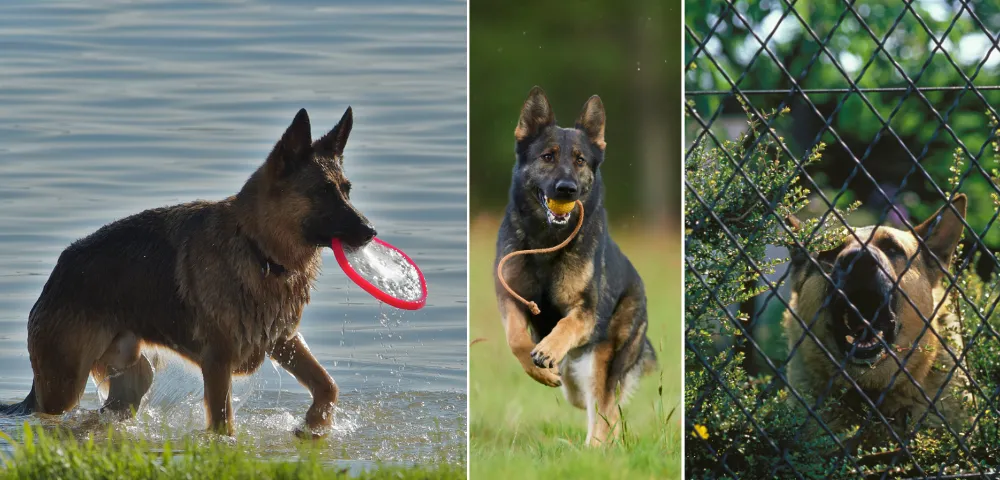Do you want to know the challenges of training and raising a German Shepherd compared to other dog breeds? You’re in the right place.
Training and raising a German Shepherd can be rewarding and challenging compared to other dog breeds. Known for their intelligence and versatility, German Shepherds are highly trainable making them excellent working dogs.
However, their intelligence also requires constant mental stimulation to prevent boredom. Unlike some more laid-back breeds, they have high energy levels. They may develop behavioral problems such as excessive barking or chewing without adequate physical activities.

German Shepherds are naturally protective, which can be advantageous but also requires careful socialization to prevent over-guarding tendencies.
|| DON’T MISS! Today’s Deals on Chewy – Pet Foods, Products, Supplies, Toys and more…
RELATED
- A Guide for Raising German Shepherd Puppy at Home
- Is German Shepherd Right for Apartment Living?
- Best Way to Take German Shepherd for Walk: A Complete Guide
- What is the Average Intelligence of German Shepherds?
- How to Determine Most Desirable Traits in German Shepherd?
- How to Know German Shepherd Breeder is Genuine?
- Male or Female German Shepherd: Which One is Better?
- Monthly & Annual Expenses of Owning a German Shepherd
- At What Age German Shepherds Slow Down?
- Effective Methods for Crate Training German Shepherd Puppy
- Training German Shepherds for Families With Young Children
- Common German Shepherd Health Myths Debunked
A German Shepherd bonds closely with its family, which is wonderful but can lead to separation anxiety if left alone for long periods. Compared to more independent breeds, they thrive on companionship and attention.

German Shepherds often excel in obedience and agility, yet their size and strength mean they must be properly trained to avoid becoming unmanageable.
RELATED
- German Shepherd Energy Levels by Age | Activity Needs
- Understanding the Prey Drive of German Shepherds
- German Shepherd Running Abilities: Speed, Distance, Endurance
- Ultimate Guide to German Shepherds Water Activities
- How to Give German Shepherd a Bath: A Complete Guide
Their loyalty makes them great family pets, but they need early socialization with children and other animals to ensure harmonious interactions. Compared to dogs with a more docile temperament, like Labradors, German Shepherds require a handler who can establish leadership without resorting to harsh training methods.

Training sessions should be varied to maintain their interest, as repetitive tasks might bore them quickly. German Shepherds need a clear purpose; without it, they may become restless or destructive. Owners must be proactive in providing a structured environment that channels their energy positively.
Health considerations are also a challenge, as they’re prone to issues like hip dysplasia, necessitating regular vet check-ups. Their dense double coat requires consistent grooming to manage shedding, which can be more demanding than breeds with shorter hair.
RELATED
- Common Mistakes to Avoid When Grooming a German Shepherd
- German Shepherd Teeth Problems: Causes, Prevention, Treatment
- 4 Types of German Shepherd Coats
- How to Extend the Lifespan of German Shepherd
Unlike smaller, more portable breeds, their size can be a constraint in households with limited space. Adolescent German Shepherds can be particularly challenging, testing boundaries vigorously, so patience is key.

Their strong prey drive may require training to manage around smaller animals. German Shepherds respond well to positive reinforcement, needing encouragement rather than punishment for optimal learning. Given their history as herding dogs, they may instinctively try to herd people or other pets.
This breed often requires a longer socialization period to deemphasize their wariness of strangers.
The potential for dominance in German Shepherds means owners must be diligent in reinforcing obedience commands regularly.
Overall, raising a German Shepherd requires dedication, consistency, and an understanding of their unique needs to ensure they become well-adjusted companions.
If you like this post then don’t forget to share with other people. Share your feedback in the comments section below.
Also Read
- How to Spot a Fake German Shepherd Puppy | 10 Tips
- How to Determine the Age of German Shepherd Puppy or Dog
- 5 Different Types Of German Shepherd Breeds & Their Features
- Top German Shepherds Breeders From All Around The World
- Do German Shepherd Puppies Lose Their Teeth?
- Regular or Retractable Leash! Best for German Shepherds?




Leave a Reply